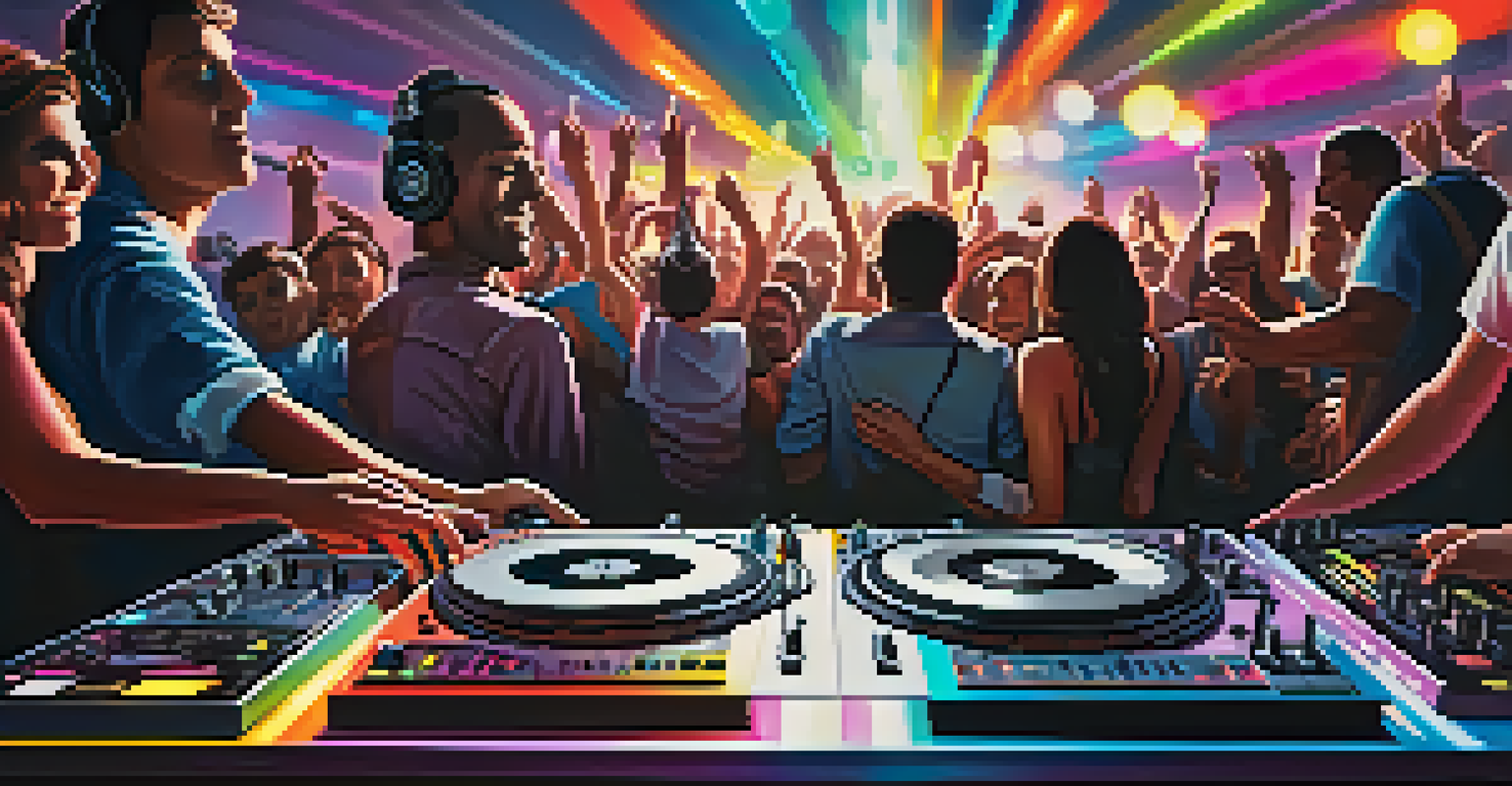The Ethics of Music Remixes: Creativity or Copyright Infringement?

Understanding Music Remixes and Their Popularity
Music remixes have become a staple in today’s music landscape, often breathing new life into original tracks. They allow artists to reinterpret songs, showcasing their creativity and unique style. From dance remixes that dominate clubs to viral TikTok snippets, these adaptations can propel both the remix artist and the original song to new heights.
Art is a collaboration, a conversation that leads to a new creation.
However, the surge in remix culture raises questions about ownership and creative rights. When does a remix become a standalone piece of art, and when does it infringe on the original creator's rights? This blurry line is at the heart of the ongoing debate surrounding music remixes.
Ultimately, remixes are a testament to the collaborative nature of music. They illustrate how one piece of art can inspire another, but they also require a careful balance between innovation and respect for the original work.
The Role of Copyright in Music Remixes
Copyright laws exist to protect artists' intellectual property, ensuring they receive credit and compensation for their work. However, music remixes often tread a fine line when it comes to these laws. Artists who remix often rely on samples from the original song, which can lead to potential copyright infringement if not properly licensed.

In many cases, remixers must seek permission from the original artists or record labels to legally use their work. This process can be daunting and may deter some aspiring remix artists from pursuing their passion. Consequently, understanding the intricacies of copyright is crucial for anyone looking to remix music.
Remixes Enhance Musical Creativity
Music remixes allow artists to reinterpret original tracks, showcasing their creativity while navigating the complexities of copyright.
Moreover, copyright laws vary by country, adding another layer of complexity. This inconsistency can create confusion for remixers who may not be aware of the specific regulations in their region, potentially leading to unintentional violations.
Creative Expression vs. Legal Boundaries
At its core, remixing is about creative expression—taking existing music and transforming it into something fresh and new. Many argue that remixes are a form of artistic dialogue, where artists build upon each other's work. This collaborative spirit is essential for the evolution of music and fosters innovation within the industry.
Good artists copy; great artists steal.
However, this creative freedom must coexist with legal boundaries. The challenge lies in finding the right balance between honoring the original creators and allowing new interpretations to flourish. Striking this balance can be difficult, as the intent of the remixer may not always align with legal expectations.
The discussion around creative expression versus legal boundaries highlights the need for clearer guidelines in copyright law. As music continues to evolve, so too should the frameworks that govern it, ensuring that both original and remix artists can thrive.
The Impact of Digital Platforms on Remixes
Digital platforms have revolutionized the way music is created and shared, giving rise to a new era of remixes. Services like SoundCloud, YouTube, and TikTok allow artists to share their work with a global audience, often leading to viral hits. This accessibility has democratized music production, enabling anyone with a computer to become a remix artist.
However, this ease of access also raises concerns about copyright infringement. While these platforms provide a stage for creativity, they can also facilitate the unauthorized use of original works. As a result, many artists find themselves navigating a complex landscape of rights and permissions.
Copyright Challenges for Remix Artists
Remixers often face legal hurdles related to copyright laws, which can vary by country and complicate the process of using original works.
Despite these challenges, digital platforms have also encouraged collaboration and community among artists. By connecting creators with their audiences, these platforms foster a culture of sharing and remixing that can benefit everyone involved.
Case Studies: Successful Remixes and Controversies
Examining specific case studies of successful remixes can offer valuable insights into the ethical landscape. For instance, the remix of Lil Nas X's 'Old Town Road' became a cultural phenomenon, blending genres and showcasing the power of collaboration. This remix not only topped charts but also sparked discussions about genre boundaries and artistic expression.
Conversely, there have been notable controversies surrounding remixes that have led to legal disputes. For example, the case of 'Blurred Lines' by Robin Thicke highlighted the fine line between inspiration and infringement, resulting in a high-profile court ruling. Such cases serve as cautionary tales for remix artists, emphasizing the importance of understanding copyright law.
These examples illustrate the complex relationship between creativity and copyright in the world of music. They remind us that while remixes can be powerful tools for artistic expression, they also require careful navigation of legal waters.
The Future of Remixes in an Evolving Music Landscape
As the music industry continues to evolve, so too will the role of remixes. With advancements in technology and changes in consumer behavior, remix culture is likely to grow. Artists may find new ways to engage with their audiences through interactive remixes or collaborative projects that blur the lines between creator and listener.
However, this growth must be accompanied by a clearer understanding of copyright laws. As new platforms emerge and remixing becomes more mainstream, it is essential for artists to be aware of their rights and responsibilities. Educating artists about these laws can help foster a more supportive environment for creativity.
Ethics in Remix Culture Matter
Navigating the ethical implications of remixes involves balancing inspiration with respect for original creators and cultural representation.
In the end, the future of remixes will depend on finding a balance between innovation and respect for original works. By encouraging collaboration while protecting creators, the music industry can continue to thrive and evolve.
Navigating the Ethical Implications of Music Remixes
Navigating the ethics of music remixes involves understanding the fine line between inspiration and appropriation. Artists must consider the impact of their remixes not only on the original creators but also on their audiences. A respectful approach to remixing can enhance the creative landscape, while a careless one can lead to backlash.
Additionally, the conversation around ethics in remix culture often intersects with broader societal issues, such as cultural appropriation and representation. Artists must be mindful of these factors when creating remixes that draw from diverse musical traditions.

Ultimately, navigating the ethical implications of remixes requires a commitment to empathy and respect. By fostering a culture of awareness and responsibility, artists can contribute positively to the music community and the ongoing evolution of creative expression.